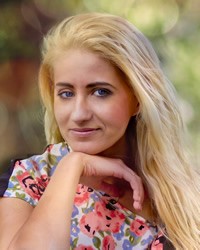Ukrainians first emerged as a people in the 800s during the medieval state of Kyivan Rus. That was a time when local Slavic tribes were merging with Viking settlers. It became one of the most powerful states during that time in European history. Through the centuries, they became vassals of the Grand Duchy of Lithuania, Ruthenia and Samogitia.
A rebellion by the powerful Cossacks in the 1600s was a turning point for the Ukrainians. They created the Cossack Hetmanate, which was located in central and eastern Ukraine. The Cossack Hetmanate was allied with Russia's Tsar. It was abolished in the 1700s by Russian Empress Catherine the Great. The Russian Empire was able to incorporate huge parts of Ukrainian territories.
Ukrainians hoped for full independence in the early 20th century, but that hope was squashed by the emerging Soviet Union led by Bolshevik forces. The Russian-dominated Soviet Union included Ukraine, along with many other neighboring states. Some were Slavic, and others were Turkic Muslims. Ethnic Ukrainians are represented in all these now-independent countries.
All Soviet states were forced to endure Russification. Russian Soviet leaders engineered a famine that cost 4-5 million Ukrainian lives. Many Ukrainians fled to other countries during this time. Many of these were within Soviet control. During WWII, Ukrainians suffered under the oppression of both German Nazis and Soviet Communists.
When the USSR dissolved in 1991, Ukraine and other Soviet states were given independence. Russia again tried to establish dominance of Ukraine in 2022 when they invaded that nation. Thousands fled to Western European countries like Portugal, where they hoped to re-establish their lives.
Ukrainians rank as the second largest ethnic minority in Portugal, having begun their migration to the country in the late 1990s.
Typically, Ukrainians in Portugal are men who came to seek employment. They are often better educated than the Portuguese majority and tend to be young. They work in low-paying jobs in manufacturing, cleaning services, construction, restaurants and hotels. In recent years, they have begun moving out of these low-paying positions and securing jobs that require more education. After the 2022 invasion of Ukraine, they have been joined by war refugees.
Wherever Ukrainians live, they are Christian, usually Orthodox or Evangelical. Ukraine is known as the Bible Belt of Eastern Europe. They are well-suited to be salt and light to the people around them.
Diaspora Ukrainians often have family members and friends in Ukraine who have endured war with Russia. There is always uncertainty about the well-being of their loved ones. Others, recent members of the Ukrainian Diaspora, are themselves enduring the traumas of war. Many have lost their homes and their livelihood in that once-peaceful land. Russians have tried to destroy Ukrainian culture for decades. Ukrainians are trying to preserve their culture wherever they live.
Pray for the Lord to be the source of comfort for Ukrainians.
Pray for the Holy Spirit to drive Ukrainians to be salt and light to the people around them.
Pray for Ukrainian Christians to disciple others in the ways of Christ.
Scripture Prayers for the Ukrainian in Portugal.
https://en.wikipedia.org/wiki/Ukrainians
https://www.npr.org/2024/12/25/g-s1-38399/ukraine-culture-traditions-russian-invasion
https://en.wikipedia.org/wiki/History_of_Ukraine
https://en.wikipedia.org/wiki/Ukrainian_diaspora
https://en.wikipedia.org/wiki/Ukrainians_in_Portugal
| Profile Source: Joshua Project |











